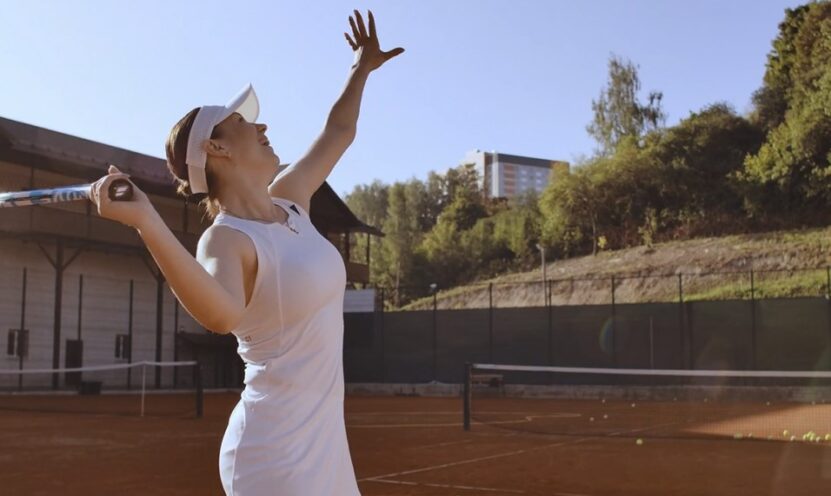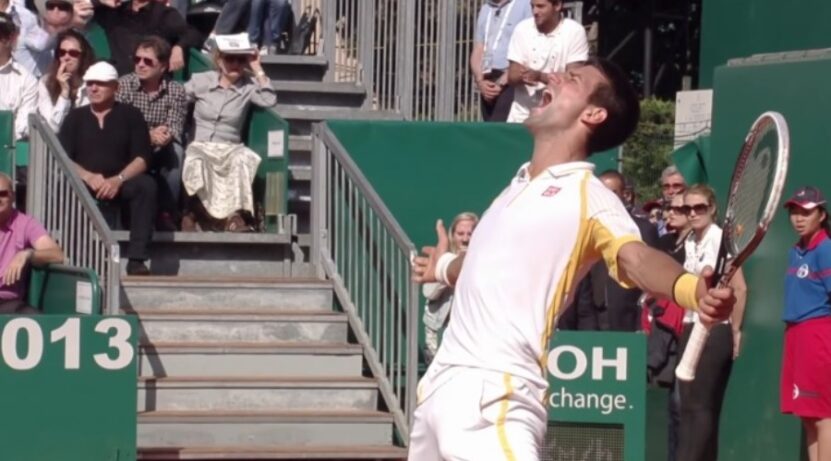Tennis is a game of finesse and athleticism. Watching tennis players hit powerful shots, move quickly across the court, and execute brilliant strategies is a spectacle to behold.
However, one aspect of the game that often leaves spectators perplexed is the loud grunting noise made by some players during the game. In this article, we’ll explore why tennis players grunt, what purpose it serves, and whether it’s a necessary part of the game.
Perplexity

The act of grunting during a tennis match has been a topic of much debate among fans and players alike. The first thing to consider is the perplexity of grunting, as it is not immediately obvious why players would choose to make these noises during a game.
While some people find it distracting and unnecessary, others believe that it’s an essential part of the sport, helping players to release tension and improve their performance. In order to fully understand the reasons behind tennis players’ grunting, it is important to delve into the science behind this phenomenon.
Several studies have been conducted on this topic, with researchers seeking to determine the physiological effects of the practice. One study found that players who grunted while hitting the ball produced a greater amount of force than those who didn’t, leading to more powerful shots.
This increased force was attributed to the additional tension generated in the abdominal muscles and diaphragm during the grunt, which allowed players to hit the ball with greater speed and accuracy.
Despite the benefits of grunting, there are still many who find it bothersome and argue that it should be banned from the sport. In response to these complaints, the International Tennis Federation introduced a rule in 2012 allowing umpires to penalize players who grunt excessively or loudly.
However, the rule has been met with mixed reactions from players, with some arguing that it unfairly penalizes them for a practice that they believe is beneficial to their performance. Ultimately, the debate over this occurrence is likely to continue for years to come, with supporters and detractors arguing their respective cases.
Burstiness

When considering the act of grunting in tennis, burstiness is another important factor to take into account. Burstiness refers to the variability between sentences or actions, and in the context of tennis, it is most evident when a player hits a shot.
The sudden burst of energy required to strike the ball can result in a loud noise that sounds like a grunt, which some players and fans find distracting or irritating.
In addition to its impact on players and spectators, burstiness can also affect the overall pace and rhythm of a tennis match. When players grunt loudly or frequently, it can disrupt the flow of the game and make it harder for their opponent to concentrate.
As a result, some players have been known to use it as a strategic tactic, intentionally making noise to throw their opponent off balance or gain a psychological advantage.
Despite the controversy surrounding this topic in tennis, it remains a common practice among players at all levels of the sport. While some view it as an annoying distraction, others see it as a natural and necessary part of the game.
Why Do Tennis Players Grunt?

There are several reasons why tennis players grunt, and it’s not just limited to one explanation. Here are some of the most common reasons why tennis players grunt during a game:
1. Enhances Focus and Timing
While the practice of grunting in tennis may be a divisive topic, some players and coaches argue that it can actually be beneficial to a player’s performance. One potential benefit of grunting is that it can help players improve their focus and timing.
When a player grunts, they breathe out forcefully, which can help them time their shots better. The timing of the grunt can also help players focus on the ball, allowing them to hit it more accurately.
2. Increases Power and Effort
In addition to its potential impact on timing and focus, some players also believe that grunting can help them generate more power on their shots. By exhaling forcefully, players can engage their core muscles more effectively, which can, in turn, help them generate more force behind their swings.
While the exact impact of grunting on power and performance is still a matter of debate, it is clear that this controversial practice is an important part of the modern game of tennis.

3. Reduces Injury Risk
Some players and coaches also argue that grunting can help reduce the risk of injury on the court. When players make a loud noise during a grunt, they also release tension and reduce the stress on their muscles and joints. This can help prevent injuries, particularly in high-intensity matches where players are pushing themselves to their physical limits.
While some critics argue that grunting is a distraction or a form of gamesmanship, it is clear that many professional players see it as an important part of their game. Whether it is used to improve performance, reduce injury risk, or simply as a personal preference, the practice of grunting is a widely accepted part of the modern game of tennis.
As the sport continues to evolve, it will be interesting to see whether making loud noise remains a controversial topic or becomes even more widely accepted by players, coaches, and fans alike.
4. Mind Games
Aside from its physical benefits, grunting in tennis can also serve as a psychological strategy. Some players use it as a mind game to throw off their opponents. The sudden and loud noise can be jarring and distracting, making it harder for the opponent to concentrate on their own shots.
In addition, grunting can also be used to intimidate opponents, especially when it is done consistently and loudly. By making a loud noise every time they hit the ball, players can create an aura of dominance on the court.
This can affect their opponent’s confidence and increase the likelihood of mistakes, giving the grunting player an advantage. However, it’s worth noting that some players and coaches frown upon using this as a psychological tactic, considering it unsportsmanlike behavior.
Are There Any Downsides to Grunting?

While grunting has some benefits, it also has some downsides. Here are some of the most common criticisms thrown in this direction:
1. Distraction to Opponents
The loud noise made during a grunt can be distracting to opponents, making it harder for them to focus on the ball.
2. Disruptive to Spectators
It can also be disruptive to spectators, especially those who find the noise unpleasant or distracting.
3. Unnecessary Noise Pollution
Some people argue that grunting is unnecessary noise pollution and that players should find other ways to improve their game.
Frequently Asked Questions

1. Can grunting affect a player’s performance negatively?
Yes, it can negatively affect a player’s performance if they rely too heavily on it, and it becomes a distraction to themselves or their opponents.
2. Can grunting be penalized by officials?
Yes, officials have permission to penalize players for excessive grunting or for using it as a distraction tactic.
3. Do all tennis players grunt?
No, not all tennis players do this. It’s a personal choice and not a requirement in the game.
4. Are there any rules regarding grunting in tennis?
There are no specific rules regarding grunting in tennis, but officials can penalize players for excessive or intentional noise-making.
5. Does grunting give players an unfair advantage?
No, grunting does not give players an unfair advantage. It’s a technique that some players use to enhance their game, but it’s not a requirement for success in tennis.
Final Words
Grunting is a common practice in tennis, and there are several reasons why players do it. It can enhance focus and timing, increase power and effort, reduce injury, and be used as a mind game by players.
However, it can also be distracting to opponents, disruptive to spectators, and unnecessary noise pollution, which is why officials have permission to penalize players for excessive noise-making.
Our website often covers topics regarding rules in tennis, and we have recently published an article about tennis net height, so if you are a fan of the game, you should definitely check it out.

